Casque d’Or [Golden Helmet] (1952)
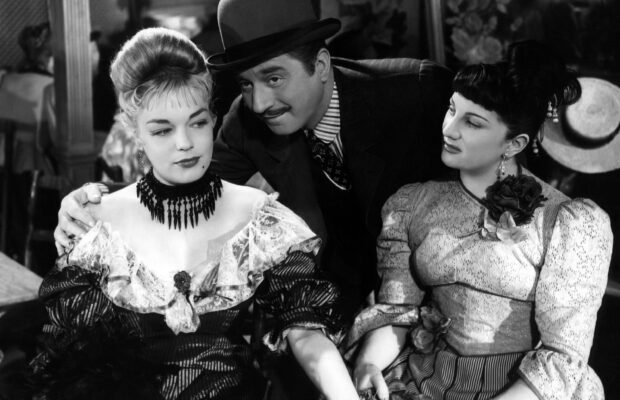
Toronto Film Society presented Casque D’Or [Golden Helmet] (1952) on Monday, October 17, 1955 as part of the Season 8 Main Series, Programme 1.
Christopher Crumpet U.S.A. 1953 7 mins.
PRODUCTION COMPANY: u.p.a.
PRODUCER: Stephen Bosustow
DIRECTOR: Robert Cannon
COLOUR PROCESS: Technicolor
With this addition to the UPA list of slightly peculiar children, a further pleasure is provided for those who like the imaginative and flexible line of draughtsmanship which has distinguished the series. The freedom and economy of the treatment produce a succession of dancing images, and the flow of the film approaches those abstract pleasures which indicate that realism is not the only way of the cinema.
– British Film Institute
Monthly Film bulletin, October 1954
Motion Painting No. 1 U.S.A. 1949 10 mins.
An Absolute Film Study by Oscar Fischinger
Oscar Fischinger is the foremost exponent of the absolute film of abstract experimentation; he has been exploring the problem of abstract motion and sound for three decades. These absolute films represent the flood of feeling created through music in visual cinematic terms. Utilizing the simplest kind of shapes, the square, the circle, and the triangle, he manipulates them along patterns suggested by the music and based upon the laws of musical form.
Motion Painting No. 1 is his longest and most ambitious work which took nearly two years to complete. Filmed in technicolor, it is an oil painting on glass with dark harmonious colours moving in segmented circles to the music of Bach’s Brandenburg Concerto.
Fischinger was originally a disciple of Walter Ruttman in Germany and came to the United States in 1937 where he made a sequence on Bach’s Toccata and Fugue for Disney’s Fantasia, Allegretto, an abstraction to jazz, Optical Poem, to Lizt’s Second Hungarian Rhapsody for MGM, An American March, and Motion Painting No. 1.
from – Experiment in the Film by Lewis Jacobs
– Ideas on Film by Cecile Starr in The Saturday Review, March 8, 1952
Thursday’s Children Great Britain 1954 22 mins.
DIRECTORS/SCRIPT: Lindsay Anderson, Guy Brenton
PHOTOGRAPHY: Walter Lassally
MUSIC: Geoffrey Wright
COMENTARY: spoken by Richard Burton
Shot at the Royal school for Deaf Children at Margate, this fine film deals with the problems of educating deaf children who are born deaf or have become deaf before they have learned the meaning of language. Short and unpretentious, it achieves its object by the simplest possible means. There are no heroics or climactic structures of pathos; the children are always laughing and happy at lessons that seem more like games. The commentary admirable spoken by Richard Burton describes calmly the nature of the problems and the way they are tackled. But through all this is revealed a great warmth of affection and a sort of defeated indignation. The secret is perhaps that the people who appear in film are treated and emerge as human beings and individuals. This has been largely achieved by the remarkable intimacy with which the camera has caught the children at their lessons and in their social life together.
– Monthly Film Bulletin, October, 1954
– INTERMISSION –
Casque D’Or [Golden Marie]
DIRECTOR: Jacques Becker
SCRIPT: Jacque Becker and Jacque Companeez
DIALOGUE: Jacques Becker
PHOTOGRAPHY: Robert LeFebvre
EDITOR: Jacques Becker
MUSIC: Georges Van Parys
LEADING PLAYERS: Simone Signoret (Marie), Serge Reggiani (Manda), Claude Dauphin (Leca), Raymond Bussières (Raymond), Gaston Modot (The Old Carpenter), Paul Barge (Inspector Juliani), Dominique Davray (Julie).
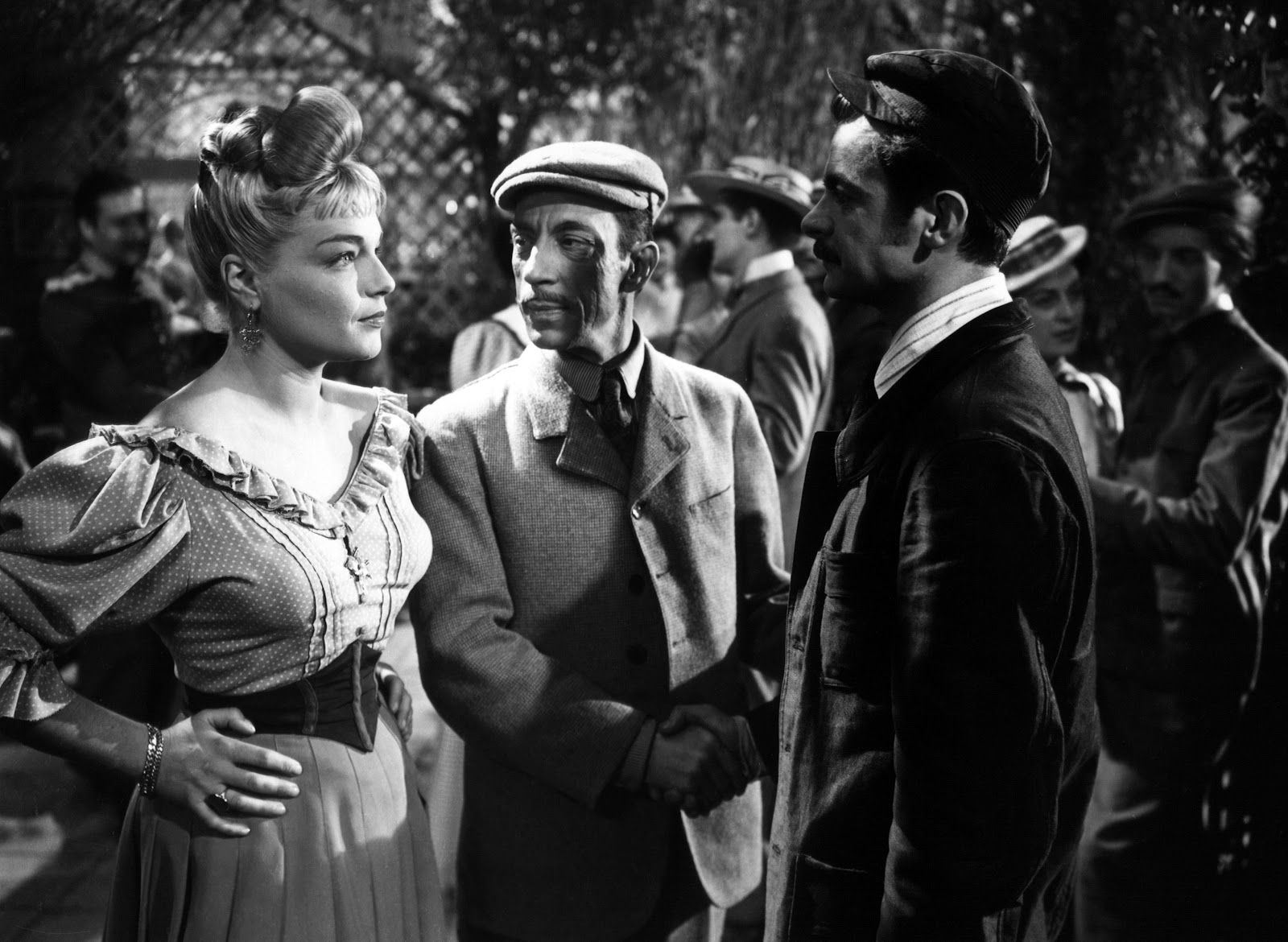
On a Sunday afternoon of the summer of 1898, a group of apaches with their gigolettes descend on a small riverside dance-hall. There, Marie, nick-named Casque d’Or, meets and falls in love with Manda, a young carpenter.
Into this setting, Becker and his co-writer, Jacques Companeez, have imagined a love story of classic simplicity. The script is economical to the point of austerity and almost perfectly “shaped”. Becker has been well served by his cameraman and art director and has himself cut the film to a rare tautness and precision. This is his first period film and he has observed the background of late nineteenth century France minutely yet without self-conscious emphasis. “Something between the painter Renoir, and Eugene Sue …” Becker has described the film.
Superbly acted by Simone Signoret and Serge Reggiani, Casque d’Or has the directness and intimacy characteristic of Becker’s work; there is a deceptive simplicity about the style, which is both subtle and gripping, sensitive and tough; the images, supported by very little dialogue, have an unostentation and deep expressiveness; and the story moves, in the closing sequences, to real tragedy.
– Sight and Sound, July-September 1952
– Monthly Film Bulletin, October 1952
NOTE: The Programme Committee is pleased to announce that a second Becker film has been obtained for the November 21 showing: Antoine et Antoinette – a poetic comedy set in post-war France.
FIRST SILENT SERIES SHOWING ON 31st OCTOBER 8.30 p.m.
Room 7, Botany Building, University of Toronto
Blind Husbands – Eric von Stroheim’s debut as writer-director-star.
RESULTS OF ANNUAL QUESIONNAIRE
Members’ “Favourite” Films (in order of preference): Marius, Maecdchen in Uniform, The Medium, My Universities, Les Visiteurs du Soir, Dumbo, Les Enfants Terribles, Adventures of Prince Achmet, Isn’t Life Wonderful?, Sherlock Jr., Red Badge of Courage.
Members’ “Best” Films (in order of merit): The Medium, Les Visiteurs du Soir, My Universities, Marius, Maedchen in Uniform, Les Enfants Terribles, Adventures of Prince Achmet, Dumbo, Sherlock Jr., Isn’t Life Wonderful?, The Red Badge of Courage.
(In seeking an explanation of the low standing of Sherlock Jr., we are wondering if possibly some members did not consider it as a “feature”.)
Members’ Favourite Shorts (in order of preference): The Rink, Corral, The Stranger Left No Card, The Unicorn in the Garden, The Telltale Heart, The Story of Time, The Open Window, The Seasons, Paul Tomkowicz Street Railway Switchman & Diary for Timothy (these two tied), O Canada Right Eye Version, Rouen Zo!, Jammin’ the Blues, 8:15, How to Ride a Horse.
(N.B. – A few members marked or underlined titles as favourites without indicating any order. This made no significant difference to the standing of any film except for Jammin’ the Blues, which would have been in sixth place on “straight votes”!)
The members’ favourite programme was the last one: Maedchen in Uniform, Corral, The Telltale Heart and The Open Window.
SUMMER FILM NOTES: (Movies I’ve found worth seeing since my last report):
From U.S.A.: Marty: for its refreshingly unadorned naturalism and understanding characterizations; East of Eden: for Elia Kazan’s creative use of CinemaScope and his feeling for time and place, plus some striking performances; Lady and the Tramp: for Disney’s charming animal humor and sure craftsmanship; Blackboard Jungle: for its mainly honest, forthright and unsentimental handling of a topical social problem; Not as a Stranger: for Stanley Kramer’s able directorial debut, the absorbing story and seemingly authentic medial atmosphere; White Feather: for its decent, dignified and restrained treatment of an American Indian theme, and the fine pictorial effectiveness of its mass action scenes.
From Britain: Court Marital and The Divided Heart: for their skilled, intelligent and moving dramatizations of real-life incidents; Chance Meeting: for its sensitive and filmic telling of a very contemporary love story; Summertime: for Katharine Hepburn and the city of Venice, both at their best; The Dam Busters: for its insistence on documentary integrity without loss of humanity.
From France: Mr. Hulot’s Holiday: for Jacques Tati’s priceless gift of true screen (i.e. wordless) comedy; The Wages of Fear: for Clouzot’s masterly and very personal direction and the shattering suspense; Forbidden Games: for the remarkable theme and the unforgettably poignant performances of the children.
From Japan: Ugetsu: for the exotic fascination of its story-telling; Gate of Hell: for its classic, formal dignity and the astonishing beauty of its Eastmancolor photography, settings and constumes.
From Sweden: The Great Adventure: for Arne Sucksdorff’s stunning technical virtuosity, and his loving, yet honest revelation of nature and wildlife. (This fine feature by the maker of Rhythm of a City is soon to be seen at the Towne Cinema).
Notes by George G. Patterson

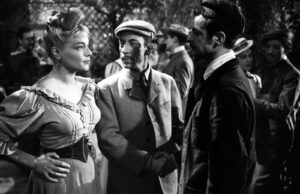
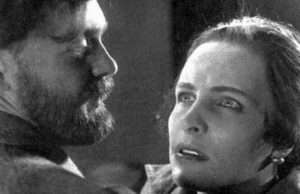
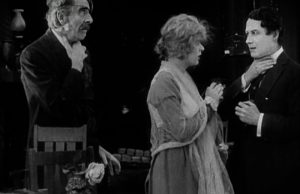






Leave a Reply